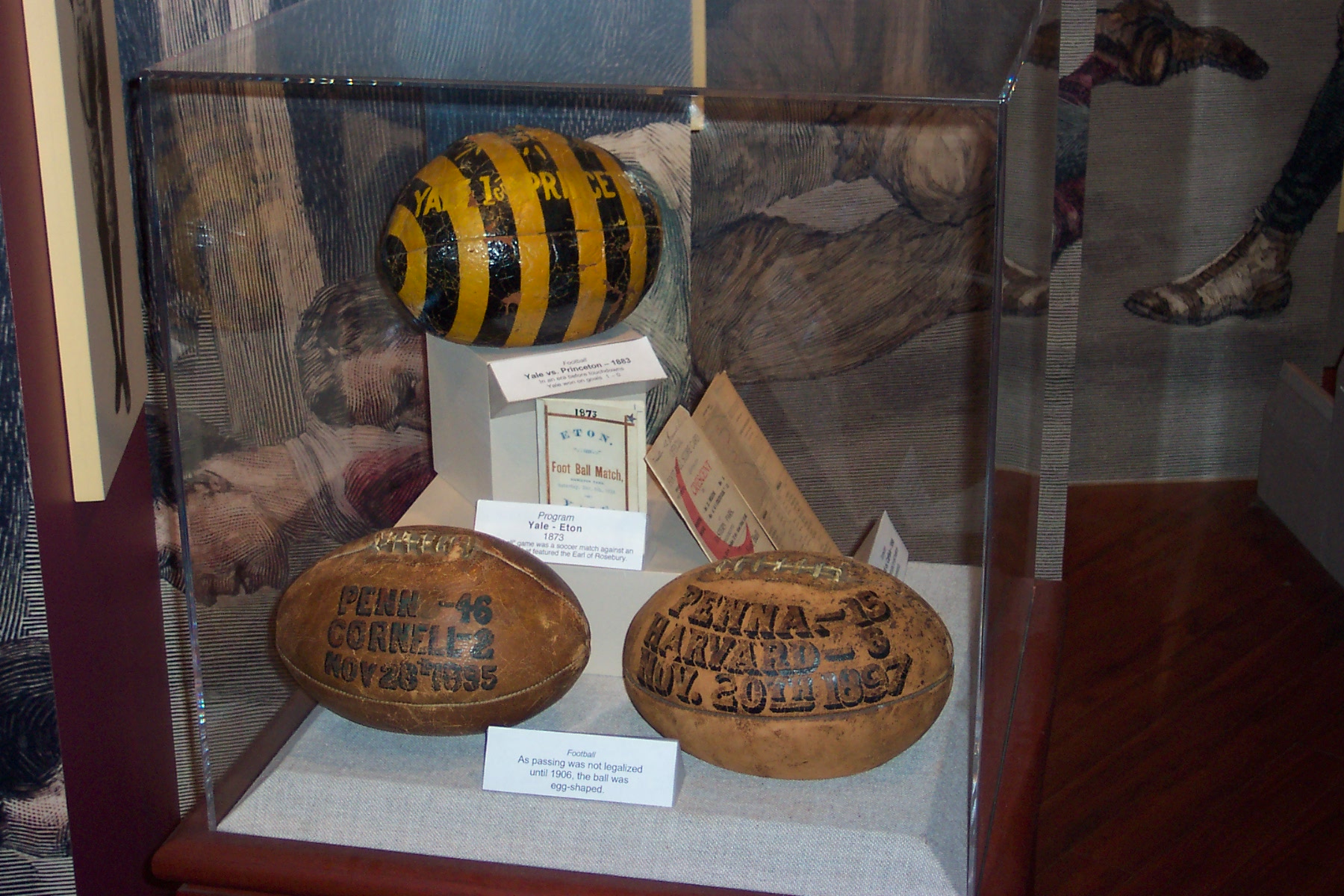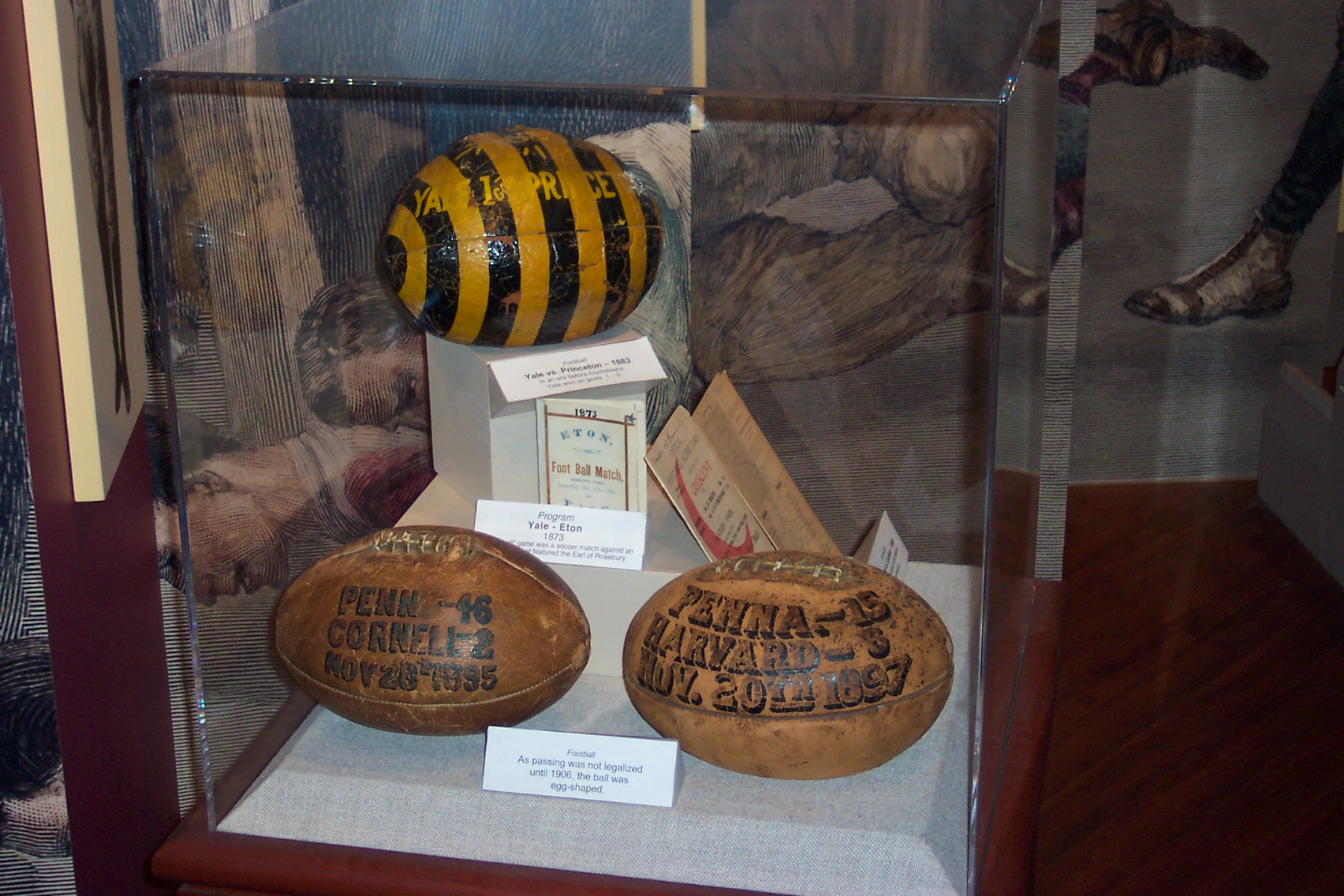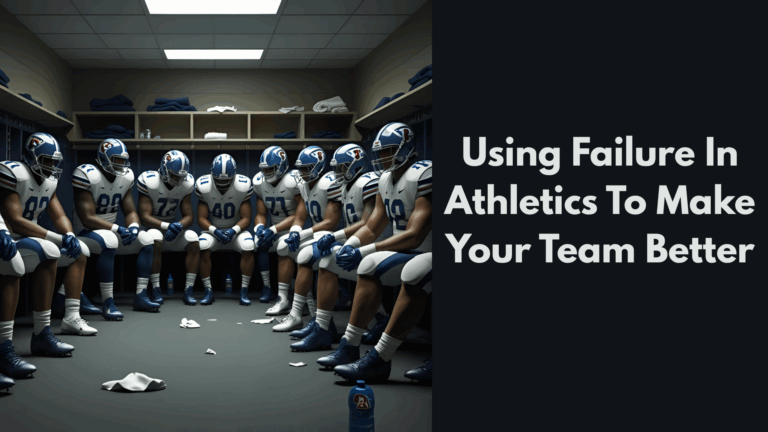
Football from the late 1800s at the College Football Hall of Fame. I visited there in 2005, just awesome. Got some great pics like this!
I really love this little gem I found years ago on the internet somewhere! I’ve only seen it once. Glad I stole it from the internet then! Enjoy these random pictures from my trip to the Pro Football Hall of Fame in 2005.
It’s dedicated to every coach who has ever had to listen to someone who never “strapped it on” imply that there is no educational value to football.
SEVENTEEN REASONS WHY FOOTBALL IS BETTER THAN HIGH SCHOOL
(excerpted from an article by Herb Childress in the April, 1998 Phi Delta Kappan)
1. In football, teenagers are considered important contributors rather than passive recipients.
Football players know that they, and nobody else, will get the job done.

2. In football, teenagers are encouraged to excel.
They are pushed to go beyond anything they’ve ever been asked to do before, to improve constantly. There is no such thing as “good enough.”
3. In football, teenagers are honored. (This doesn’t happen for members of the consumer math class.)
4. In football, a player can let the team down.
Personal effort is linked to more than personal achievement; it means the difference between making the team better or making it weaker, making a player’s teammates grateful for his presence or irritated with his apathy.
5. In football, repetition is honorable.
Students do the same drills over and over – and get better at them. And as the skills get easier, players start to use those skills to do things that are more complex.
6. In football, the unexpected happens all the time.
There’s no opportunity to coast, to tune out, to sit back and watch others work. Every player is required to be involved and absorbed in his work, and a talented player who holds back is held in lower regard than his less talented but more engaged teammates.

7. In football, practices generally run a lot longer than 50 minutes.
And when they do end, there’s a reason to stop: the players work until they get it right or until they’re too tired to move any more. The classroom schedule responds to pressures that come from outside the classroom – state laws, other class schedules, bus schedules and cafeteria schedules.
8. In football, the homework is different from the work that’s done at practice.
Football requires a lot of homework that comes in the form of running and weight training. The work done at home and the work done in common are two different jobs, and each is incomplete without the other. Students do worksheets in the classroom and then very often are assigned to do the same kind of worksheet at home.
9. In football, emotions and human contact are expected parts of the work.
When players do well, they get to be happy; when they do poorly, they get to be angry. They are supposed to talk with one another while things are going on. But in most classrooms, we have no tools to make use of happiness or frustration, and we generally prohibit communication except for the most restricted exchanges.
10. In football, players get to choose their roles.
Not only do they choose their sport, but (to varying extents) they also choose their favorite position within that sport, carrying with it a set of requirements and responsibilities and difficult learning assignments, and youngsters still do them voluntarily.
11. In football, the better players teach the less-skilled players.
Every player is constantly surrounded by other players who can do things well and who love doing what they do. The really good players are allowed to show off – in fact, it’s demanded that they show off, that they work to their highest capacity. In the classroom, the best students aren’t often given a chance publicly to go beyond what everyone else is doing.
12. In football, there is a lot of individual instruction and encouragement from adults.
Let’s admit a basic truth: bigger classes make personal contact more difficult. A coach who has only nine defensive linemen to deal with for an hour is going to have a pretty good sense of who these youngsters are, what drives them, what they can and can’t do.

13. In football, the adults who participate are genuinely interested.
And they don’t say it in words so much as in their actions, in the way that they hold themselves and dive in to correct problems and give praise.
14. In football, volunteers from the community are sought after.
There are almost never volunteers in the classroom – no adults who seem to believe that math or chemistry is so interesting that they would help out for free on a regular basis.
15. In football, ability isn’t age-linked.
Freshman who excel can play varsity. When a student tries out for football, he gets a careful looking-over by several coaches, and if he’s really good enough, they’re going to move him up fast. In a ninth-grade English classroom, an extraordinary student can’t go beyond what the other ninth-graders are doing, even if he could profit by being with seniors.
16. Football is more than the sum of its parts.
Players practice specific moves over and over in isolation, but they know that their job at the end is going to mean putting all those moves together.

17. In football, a public performance is expected.
The incentive to perform in front of family and friends is a great motivating force. The potential for a poor performance is another motivator – nobody wants to be embarrassed in public. But schoolwork is almost always performed and evaluated in private, and successes and failures are unseen and have no bearing on the happiness of others.


